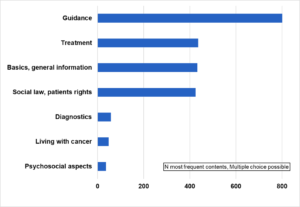Special Times Call For Special Measures
The Cancer Information Service provides multilingual services for refugees from Ukraine with cancer.
With the beginning of the Russian war of aggression in Ukraine, the Cancer Information Service recorded a steady number of inquiries from refugees with cancer from Ukraine. Many of them had to discontinue their cancer treatment hastily or could not even start it as planned. Whom should they turn to, who pays the costs, what formalities have to be taken into account upon arrival in Germany? These and other urgent questions reached the doctors at the German Cancer Information Service. It quickly became clear that the Service, which is primarily German-speaking, had to take immediate action to provide information support to refugees with cancer who are threatened not only by the events of war but also by a lack of medical care.
News on www.krebsinformationsdienst.de
Already at the beginning of March 2022, an information text was published on the website of the Cancer Information Service. For this purpose, all available facts concerning entry procedures, registration, necessary documents, contact persons and medical care for Ukrainian cancer patients were thoroughly researched and compiled. With the support of native speakers from the DKFZ, the texts were translated into Ukrainian, Russian and English. In order to provide reliable and helpful information to those affected, the information text is kept up to date with the latest knowledge.
High reach on social media
Posts on Instagram and Facebook reached approximately 21.749 people by the end of August 2022, more than the Cancer Information Service usually reaches through its social media channels. This result seems to underline the importance of social media for the dissemination of information, especially in times of crisis.
E-mail service responds multilingually
Supported by native speakers from the DKFZ as well as a professional translation agency, the physicians of the e-mail service were very quickly able to answer individual questions also in Ukrainian and Russian. The service has been very well received: From February to the end of August 2022, about 1,160 inquiries were answered by mail or telephone. Thematically, the focus was primarily on finding points of contact, but questions about treatment were also in the spotlight. In addition, there were numerous inquiries about social security law and patients’ rights – which is little surprising, since these inquirers are hardly familiar with the German healthcare system (see figure).
Overall, the number of inquiries has now reached a constant level, but at the same time the content of the inquiries is becoming more complex.
Necessary care not always guaranteed
Through several inquiries, the physicians of the Cancer Information Service have gained insight into the implementation practice of the bureaucratic procedures by which Ukrainian refugees are granted access to medical care in Germany. The interim impression: medically relevant decisions, such as on the further therapy of cancer patients in need of treatment, were not always made in an appropriate manner, especially in the first few months. Corresponding feedback has been given to health policy makers at the federal and state levels. This contributed to improve the situation for those affected and ensure that their medical care is provided in a timely manner.
Figure Most frequent contents of the inquiries in the period from February to the end of August 2022.
Submitted by: Dr. Susanne Weg-Remers: s.weg-remers@dkfz-heidelberg.de
